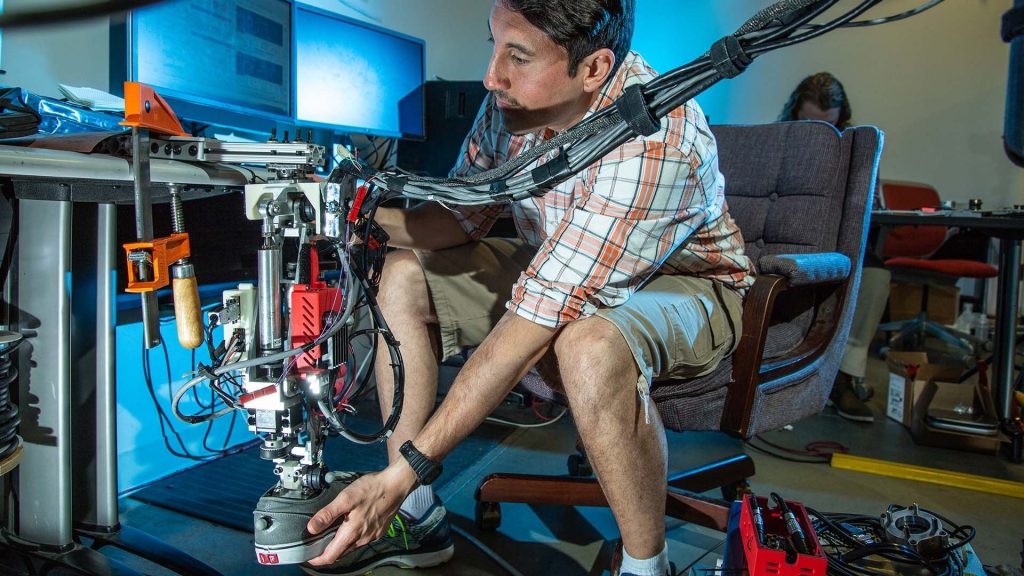Cross-Disciplinary Programs
UT Dallas offers several programs that cross the boundaries between traditional departments and disciplines.

Bioinformatics and Computational Biology
Unlocking genetic and cellular secrets involves massively complex analysis by researchers with backgrounds in biology, computer science and mathematical science.
Students in the MS in bioinformatics and computational biology program meet the demand for a new breed of scientist with an interdisciplinary and fundamental understanding of how these research fields intersect to answer scientific questions new and old.
Biomedical Engineering
Biomedical engineering involves the application of engineering principles and methods to define and solve problems in medicine and biology. Students choose biomedical engineering to be of service to people, for the challenge of working with living systems and to apply advanced technology to problems of health care delivery.

Graduates of the master’s program in biomedical engineering will be capable of undertaking challenging projects that require advanced knowledge of the design of mechanical, electrical and thermal systems, focused on life science applications.
Graduates of the doctoral program in biomedical engineering will be able to identify future applications in the field, analyze current technology capability and synthesize new solutions that extend the state of the art in biomedical applications.
Biotechnology
A field projected for rapid growth, biotechnology captures the exciting potential made possible by the decoding of the human genome and advances in bioanalytical instrumentation. The master’s program in biotechnology is designed so that students may enter the program with a wide range of prior disciplinary backgrounds, prepare for and take the four core courses, and choose from a wide range of approved electives to tailor the remainder of the degree program to their career opportunities. The MS degree in biotechnology prepares students for careers in biotechnology and biomedicine and to assist currently-employed professionals in enhancing their career opportunities.
Computer Engineering
Computer engineering at the Erik Jonsson School of Engineering and Computer Science is a broad discipline dealing with sensing, processing and transmitting information by using electrical engineering and computer science principles. The computer engineering master’s and computer engineering doctoral degrees emerged, in fact, as a bridge between the increasingly overlapping disciplines of computer science and electrical engineering.
Graduate study in computer engineering at the Jonsson School prepares students for research, development and design positions that require the use of skillful and imaginative solutions to engineering problems. The program also encourages students to develop synergies with disciplines outside of engineering, such as medicine and the life sciences.
Geospatial Information Sciences
A joint collaboration of the School of Economic, Political and Policy Sciences, the School of Natural Sciences and Mathematics and the Erik Jonsson School of Engineering and Computer Science, the graduate programs in geospatial information sciences aim to cultivate innovative researchers capable of advancing the frontiers of knowledge in the geospatial information sciences through improved theory, advanced methodology, sophisticated quantitative analysis, innovative technology and integrative application.
Graduates find employment in the growing geospatial technology industry, in research departments of public and private organizations, and in more traditional academic positions because of their ability to build bridges among disciplines.
Learn more about the geospatial information sciences master’s and geospatial information sciences doctoral degrees.
Interdisciplinary Studies

The MA in interdisciplinary studies is designed for students who seek an approach to graduate work that matches their diverse professional interests. In the course of completing their degrees, students approach topics and problems from the perspectives of more than one discipline to develop a better understanding of the many social, cultural and scientific forces that affect the individual and society.
Materials Science and Engineering
The Department of Materials Science and Engineering offers a materials science and engineering master’s degree and a materials science and engineering doctoral degree involving the study of advanced materials and their use in new and sophisticated applications. These materials include metals and their composites, polymers, silicon and bio-materials. The field is multidisciplinary in nature, combining elements of physics, chemistry and biology in addition to engineering.
UT Dallas has recently undergone substantial growth in materials characterization and synthesis capabilities, providing graduate students with tools uniquely suited to engage in research involving many aspects of modern materials science and engineering.
Systems Engineering and Management
The Systems Engineering and Management Program, jointly run by the University’s Erik Jonsson School of Engineering and Computer Science and the Naveen Jindal School of Management, teaches students to apply scientific and management principles to the design, development and operation of complex projects that often involve large interdisciplinary teams working on tight deadlines toward ambitious goals. Students studying in either school can pursue the MS degree. Typically, students will already have earned a bachelor’s degree in engineering, computer science, math, physics, chemistry, economics or finance. Instruction focuses not only in high-tech areas such as systems integration and networks but on business and operations management.